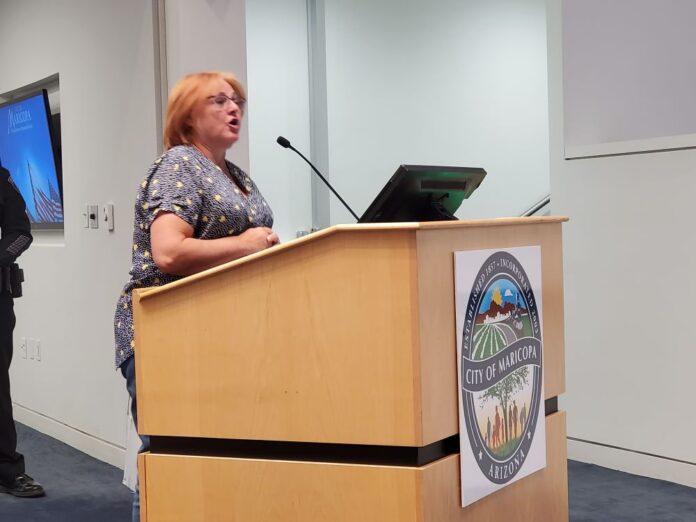
If Maricopa City Council was expecting significant public input at its work session on recreational marijuana, it may be disappointed.
Just a handful of residents provided comments at Tuesday’s two-hour session, which ended with the council putting off a decision on the controversial issue.
Most councilmembers did not indicate whether they favored or opposed dispensaries in town, saying they preferred to gather more information before deciding whether to loosen the onerous restrictions under which a recreational marijuana dispensary might operate in the city. In fact, Vice Mayor Nancy Smith recommended delaying a vote until after the next meeting to give council ample time to research the issue and solicit additional public input.
Community feedback was in short supply Tuesday, as only four residents showed up to comment in person and just 15 others submitted questions via email. About two-thirds of all comments opposed recreational dispensaries, while the other third was divided between support for dispensaries and general questions about Proposition 207, which voters approved in November to legalize the recreational use and sale of marijuana.
The proposition passed in all 10 of Maricopa’s voting precincts.
Several comments indicated a lack of knowledge about the legislation, expressing support for council to make it recreational pot illegal in the city. The council cannot overturn state law.
The council can, however, make it difficult to operate a dispensary in the city – which it did in an emergency action on Feb. 16, passing an ordinance requiring anyone wishing to open a recreational dispensary to also operate a medical marijuana dispensary as well. This is known as a dual-license mandate.
Councilmember Vincent Manfredi was the only member of the council to speak out against the mandate.
“With the ordinance we put in place a couple of months ago, we effectively said ‘you can’t have recreational dispensaries in Maricopa,’” Manfredi said. “Regardless of what we say, right now they can’t. My opinion is simply, it’s a free market. I’ve already said it a hundred times, I don’t want a marijuana dispensary in the city of Maricopa. But my opinion is – and it’s just that, an opinion – the people chose to have a recreational dispensary in the city of Maricopa.”
Manfredi noted that medical dispensaries must operate as not-for-profit entities, adding a huge financial burden to anyone who might want to open a recreational facility.
“We’re forcing someone to build a non-profit medical dispensary to have the ability to build a recreational facility,” he said. “It’s like telling the guy who wants to bake cupcakes, first you’ve got to open a non-profit bread factory, then you can bake cupcakes.”
On Tuesday, City Manager Rick Horst lauded the council’s action on the ordinance, which came ahead of a state deadline that required cities to have their own ordinances in place or be forced to follow state rules when they took effect.
“The action the council took previously preserved the right to do what you’re doing today,” Horst said. “We would not have had the opportunity to have public meetings or get any input or could not have made any changes if you did not preserve this opportunity today.
“I think it’s important to take a little extra time to explain that you preserved the ability for the public to come forward and share their comments with you.”
Smith followed that up by stating the council is doing exactly what the state ordinance called for – exercising local control over the issue.
“Even though some of those that voted to legalizing marijuana, Prop 207, they also approved the pieces specifically that allowed for local control,” Smith said. “So, every city gets to decide what that local control means. And so, our action that we took previously allowed for us to have this meeting, which gathers the input on what type of local control you want. Do you want it on every corner, or do you want a limit to how many there are?”
One of the residents who addressed the council in person, Tena Dugan, was bothered by the restrictiveness of the dual license mandate.
“One of the things that every one of you up here on this council preached to us is that if they can meet the requirements, any business can come to Maricopa,” Dugan said. “And as Mayor Price has to answer the question over and over again why we have 25 nail salons and pizza places, that’s the reason. But in this particular case, you’re making it so restrictive that they can’t come, and I have a problem with that, knowing the will of the people.
“We shouldn’t make it so restrictive that we say we allow them to come in, but in reality, we did everything we could to prevent it.”
While councilmembers voiced their gratitude for the input from the citizens, the consensus was that information needed to be gathered prior to a council vote on a final ordinance. All indications are that there will be at least one more opportunity for public input and prior to a final council vote on how to regulate dispensaries in the city.
Full disclosure: Vince Manfredi is minority owner of InMaricopa.

![MHS G.O.A.T. a ‘rookie sleeper’ in NFL draft Arizona Wildcats wide receiver Jacob Cowing speaks to the press after a practice Aug. 11, 2023. [Bryan Mordt]](https://www.inmaricopa.com/wp-content/uploads/2024/04/cowing-overlay-3-218x150.png)




![Maricopa’s ‘TikTok Rizz Party,’ explained One of several flyers for a "TikTok rizz party" is taped to a door in the Maricopa Business Center along Honeycutt Road on April 23, 2024. [Monica D. Spencer]](https://www.inmaricopa.com/wp-content/uploads/2024/04/spencer-042324-tiktok-rizz-party-flyer-web-218x150.jpg)





![Alleged car thief released without charges Phoenix police stop a stolen vehicle on April 20, 2024. [Facebook]](https://www.inmaricopa.com/wp-content/uploads/2024/04/IMG_5040-218x150.jpg)

![MHS G.O.A.T. a ‘rookie sleeper’ in NFL draft Arizona Wildcats wide receiver Jacob Cowing speaks to the press after a practice Aug. 11, 2023. [Bryan Mordt]](https://www.inmaricopa.com/wp-content/uploads/2024/04/cowing-overlay-3-100x70.png)


